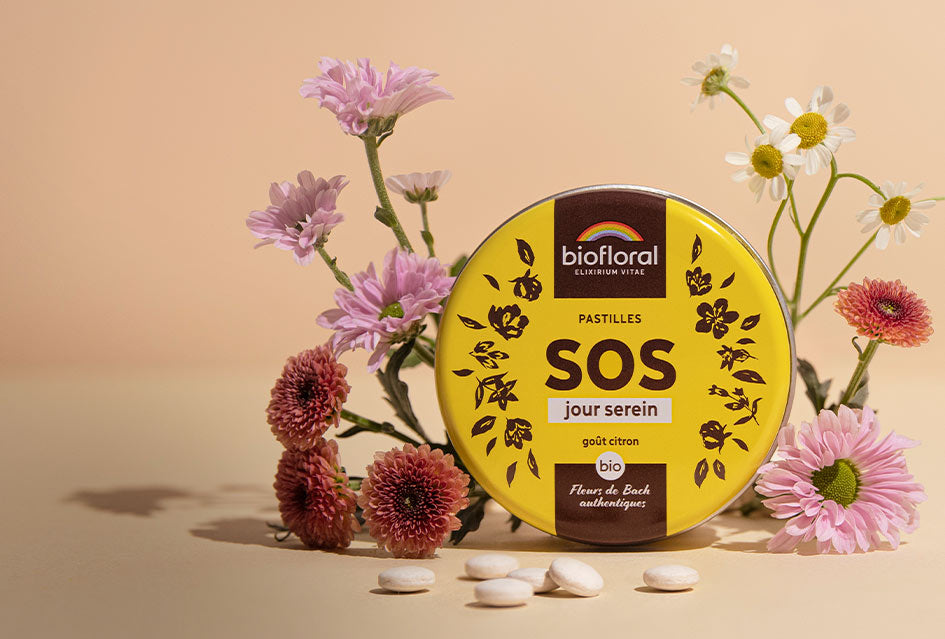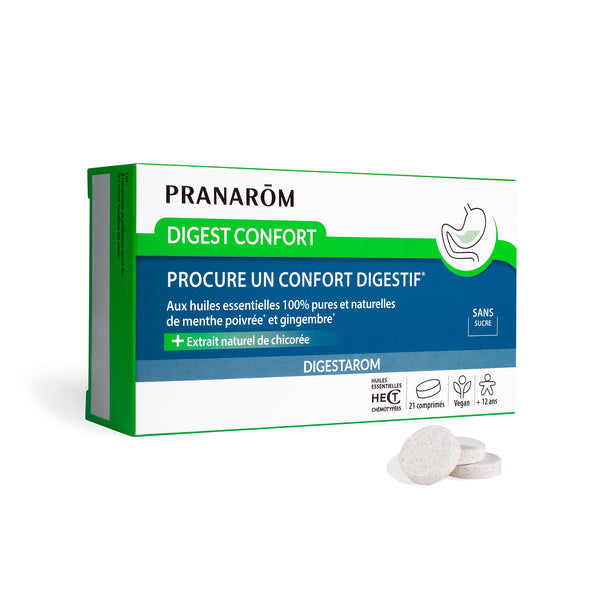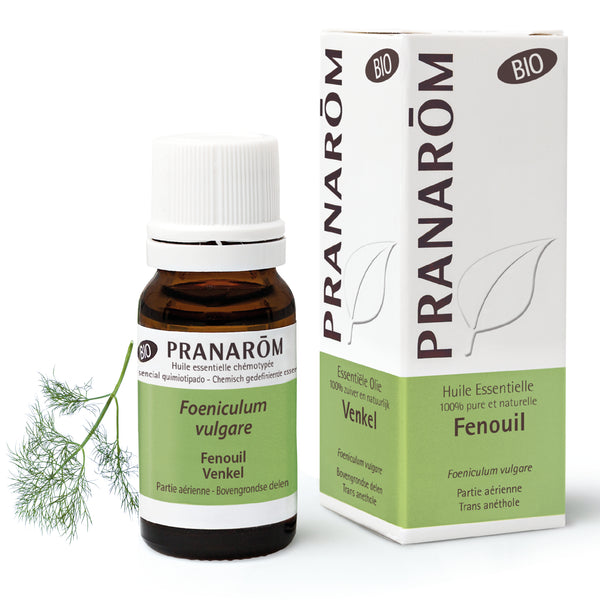Digestive problems: natural solution for a soothed stomach
Bloating, heaviness, cramps, reflux, or nausea ... Sometimes, just one meal is enough for digestion to go haywire and turn a moment of pleasure into a real ordeal. When it becomes difficult, slow, or uncomfortable, digestion can affect more than just the stomach: fatigue, irritability, disrupted sleep, or stress are often indirect consequences. Increasingly common, these disorders affect all generations and can be explained by multiple factors, whether dietary, emotional, or lifestyle-related.
Faced with these inconveniences, many people are looking for natural alternatives that are effective, respectful of the body, and easy to integrate into their daily lives. And the good news is that nature has no shortage of resources to help us. Essential oils, medicinal plants, targeted supplements, as well as simple actions and appropriate dietary choices can truly make a difference.
Whether you suffer from reflux after meals, chronic bloating, irregular bowel movements, or stress-related abdominal spasms, there are natural solutions to gently support your digestive system. In this article, explore the most effective approaches to relieve your aches and pains, improve your digestive comfort, and restore a peaceful stomach , without disrupting your daily routine.
Understanding Digestive Disorders: Causes and Symptoms
The different digestive disorders
Digestive disorders are common and varied, and each of them can profoundly impact daily life. They encompass a range of uncomfortable symptoms, from the mild to the debilitating: gastric reflux, heartburn, bloating, nausea, constipation, diarrhea, cramps , or even diffuse abdominal pain . These symptoms are not limited to temporary discomfort; when they become recurrent, they can affect sleep quality, energy levels, and even mood. In other words, poor digestion can affect both physical and emotional well-being.
Whether acute, chronic, occasional or persistent, these disorders reflect an imbalance in the functioning of the digestive system , which can affect the stomach, small intestine, colon or even the liver. It is therefore essential to understand their nature to better relieve them.
Among the most common digestive disorders, we can distinguish in particular:
- Dyspepsia , or "poor digestion": this manifests itself by a feeling of heaviness after meals , heartburn, acid reflux or even intestinal gas . Dyspepsia is often linked to meals that are too large or too rich, insufficient chewing, or even stress. It can be occasional, but can become bothersome when it becomes established over time.
- Irritable bowel syndrome (IBS) : this chronic functional disorder particularly affects women and is characterized by alternating constipation and diarrhea , recurring abdominal pain, persistent bloating and a feeling of a constantly "swollen" stomach. Although benign, it can seriously disrupt social, professional and emotional life. Its origin is multifactorial: stress, diet, heightened intestinal sensitivity, etc.
- Intestinal transit disorders : These mainly include constipation, marked by a slowing of the passage of stools, and diarrhea, often due to overly rapid digestion or intestinal inflammation. These imbalances can be temporary (change in diet, travel, stress) or part of a more general digestive system disorder.
Each of these disorders has its own specificities, but all reflect a need for digestive rebalancing . Fortunately, natural solutions exist to address both the causes and the symptoms, without harming the body.
Common causes of digestive problems
There are many factors responsible:
- A diet that is too rich, fatty or too sweet;
- Excessive consumption of coffee, alcohol or carbonated drinks;
- Stress and anxiety that disrupt the digestive system;
- Insufficient chewing;
- Food intolerances (lactose, gluten, etc.);
Certain lifestyle habits, such as eating too quickly, snacking or sitting too long after a meal, also contribute to the onset of these disorders.
Essential Oils to Help the Digestive System
Peppermint Essential Oil: A Solution to Help with Nausea and Bloating
Known for its refreshing and antispasmodic effect, Peppermint Essential Oil helps relieve bloating, nausea, and digestive spasms. It also acts against abdominal pain linked to poor digestion.
Use : A few drops on an inhaler stick or 1 drop on a sugar cube or in a spoonful of honey after a heavy meal.
Contraindications : pregnant and breastfeeding women, children under 6 years old and people with epilepsy.
Ginger Essential Oil: a digestive stimulant
A recognized digestive tonic, Ginger Essential Oil helps improve digestion and helps reduce nausea. It stimulates the production of gastric juices and combats intestinal laziness.
Use : by olfaction on an inhaler stick. For cutaneous use, diluted in a Vegetable Oil for abdominal massage or orally: 1 drop in a spoonful of vegetable oil or honey can also be taken internally.
Contraindications : pregnant and breastfeeding women, children under 6 years old
Fennel Essential Oil: to soothe stomach aches
Digestive and carminative, Fennel Essential Oil helps relieve bloating, stimulate transit and reduce intestinal gas. It is particularly suitable for slow digestion.
Use : 1 drop diluted in a vegetable oil for a circular massage on the stomach.
Contraindications : pregnant and breastfeeding women and children under 6 years old.
To maximize the benefits of essential oils and gently address digestive discomfort, you can combine several essences with complementary properties. Pranarôm offers a specially formulated recipe to support digestion and relieve digestive cramps and bloating.
In the event of temporary digestive problems, Essential Oils offer a natural, effective, and targeted solution. Whether to help soothe bloating, calm nausea, or restart sluggish bowel movements, Peppermint, Ginger, and Fennel are particularly useful. Their antispasmodic, tonic, and carminative properties help restore abdominal comfort on a daily basis, provided that the usual precautions are followed.
To discover solutions based on Essential Oils adapted to digestion and transit , explore Pranarôm's expert selection: Digestion and transit – Pranarôm
Other natural solutions at your fingertips
Plants that ease digestion
Medicinal plants are real allies in the fight against digestive disorders:
- Roman Chamomile : soothing and antispasmodic;
- Lemon balm : relaxing, it calms digestive stress;
- Artichoke and black radish : liver detoxifiers;
- Ginger : root known for its digestive properties;
All of this can be consumed as an infusion after meals or in the form of dry extracts.
Foods and Eating Habits to Improve Digestion
Certain foods promote natural digestion:
- Lemon (warm juice on an empty stomach);
- Foods rich in probiotics;
- Soft fibers;
- Fennel or cumin seeds;
- Eating slowly, chewing well and respecting regular schedules contributes to digestive balance.
Activated charcoal (or vegetable charcoal): a natural ally for digestion
Among the often overlooked but highly effective natural solutions, activated charcoal occupies a prominent place in the relief of digestive issues such as bloating, gas, and feelings of heaviness. Derived from organic plant matter, this activated charcoal is finely porous and acts like a sponge for toxins and intestinal gas.
Thanks to its adsorption capacity, it traps unwanted substances responsible for digestive discomfort, thus promoting a gentle cleansing of your digestive system . It can be used occasionally after a large meal, or during episodes of difficult digestion, in addition to other natural remedies.
Recommended use : in capsule or powder form, to be taken with a large glass of water, ideally away from meals so as not to hinder the absorption of nutrients.
Activated charcoal is an excellent natural supplement for those looking to achieve a lighter stomach without systematically resorting to conventional medications.
Baking soda: a grandmother's remedy for better digestion... and against gastroesophageal reflux
Both economical, versatile and effective, baking soda is often recommended for its action against digestive disorders (difficult digestion, heartburn or gastric reflux).
Diluted in water, bicarbonate reacts with stomach acid and helps neutralize it. It can thus quickly reduce the burning sensation associated with reflux and contribute to more peaceful digestion .
To benefit from its digestive benefits, simply mix half a teaspoon of baking soda into a large glass of warm water. Drink this mixture slowly, preferably one to two hours after a meal, when discomfort first occurs. The effect is usually rapid.
Caution: This product is intended for occasional use only. Too frequent consumption may unbalance the body's pH, increase sodium intake, or mask an underlying digestive disorder.
Find our natural recipe to calm stomach discomfort .
Digest Comfort: a targeted and natural ally
DIGEST COMFORT is a natural solution to help quickly relieve difficult digestion , especially after a large meal or in case of motion sickness. This supplement combines 100% natural active ingredients such as chicory extract, rich in fiber and minerals, with organic Essential Oils of Ginger, Peppermint, Star Anise, Caraway, Chinese Cinnamon, Lemon and Mandarin.
Its suckable or chewable format offers fast relief while leaving breath fresh . Gluten-free, sugar-free and free from controversial ingredients, it is ideal for people concerned about their digestive well-being.
Diet and digestion: key advice
What to eat to aid digestion
To promote harmonious digestion and relieve digestive problems , it is essential to choose a balanced diet that respects the functioning of your body. Favor foods rich in fiber, especially mild fiber, which facilitates transit without irritating the intestine. Also integrate digestive plants in the form of infusions or foods, to benefit from their multiple soothing and stimulating properties.
It's recommended to regularly include cooked fruits and vegetables in your meals, as gentle cooking improves digestibility while preserving nutrients. Opt for steamed or en papillote cooking, which limits the presence of saturated fats, which are often responsible for digestive heaviness, especially after meals.
Here is a short, non-exhaustive list of foods to favor for better digestion:
- Wholegrain rice, rich in soluble fiber , is gentle on the intestine and regulates transit.
- Ripe bananas, a fruit rich in easily digestible carbohydrates , which soothe the digestive mucosa.
- Cooked apple, ideal for calming heartburn and aiding digestion thanks to its pectins.
- Root vegetables, such as carrots or parsnips, which provide soluble and insoluble fiber , essential for regular transit.
- Lean meats (chicken, turkey) and white fish, which provide quality protein, easy to digest and low in fat, suitable even for those with fragile digestion.
Choosing these foods offers you a natural connection between nutritional balance and digestive relief, a key element for comfortable digestion.
Drinks that promote good digestion
Nature also offers beneficial drinks to support digestion. After a meal, choose:
- Herbal infusions such as chamomile, peppermint, fennel or lemon balm, known for their soothing and antispasmodic properties , are ideal for calming cramps and bloating.
- Lemon juice diluted in warm water, which stimulates the production of digestive juices and promotes better assimilation of food.
- Coconut water, rich in electrolytes, which helps with hydration and proper intestinal function.
Conversely, it is advisable to avoid coffee, alcohol and sodas, especially after a heavy or fatty meal, as these drinks can aggravate symptoms of heavy digestion and disrupt the intestine.
The importance of a healthy lifestyle in preventing digestive disorders
Physical activity and digestion
Digestion isn't just about what you eat; your lifestyle plays an equally crucial role. Regular physical activity , even moderate, promotes intestinal motility and limits feelings of heaviness after meals. A simple 15- to 30-minute walk after a meal can significantly improve transit and reduce bothersome symptoms.
Yoga, for example, with its twisting postures, gently stimulates the digestive organs and relieves abdominal tension. This physical approach helps strengthen the mind-body connection, which is particularly important because stress directly affects digestion .
The role of stress and how to manage it
Stress is a major factor in the onset or worsening of digestive disorders. When it's too intense or prolonged, it slows digestion, creates imbalances in the intestinal flora, and can aggravate symptoms such as bloating, pain, or reflux.
To counter these effects, several tips can be applied on a daily basis:
- Practice abdominal breathing, which helps release tension and calm the nervous system;
- Learn about meditation, an effective method for reducing stress and improving your overall well-being;
- Use relaxing essential oils , such as Sweet Orange Essential Oil , known for its soothing and invigorating properties.
- Gently massage your stomach with vegetable oils blended with specific essential oils to support digestion and relax abdominal muscles.
This stress management , combined with an appropriate diet, constitutes an effective and natural response to prevent digestive disorders.
When to consult a healthcare professional
Warning signs and serious symptoms
If your digestive problems become frequent, intense, or are accompanied by worrying symptoms such as:
- Digestive bleeding , visible in stools or vomit;
- Unexplained weight loss , despite a normal diet;
- Persistent chronic fatigue ;
- Unexplained fever .
It is important to consult a healthcare professional quickly.
The importance of professional diagnosis
An accurate diagnosis is essential to guide appropriate care . Your doctor may prescribe additional tests such as blood tests, ultrasounds, or colonoscopies to rule out more serious conditions and implement targeted treatment.
To learn more about this topic, you can consult this expert Pranarôm article on digestive colic and cramps .
To conclude
Digestive disorders, as common as they are varied, can profoundly impact daily quality of life. Bloating after meals, sudden spasms, gastric reflux, or persistent nausea are all signals the body sends to demand a return to balance. Faced with these discomforts, solutions don't always lie in conventional medications: nature offers a multitude of gentle, effective, and accessible remedies to support the digestive system in its essential functions.
Essential oils , such as Peppermint , Ginger or Fennel , are of great help in calming spasms, regulating transit or relieving nausea. Combined with medicinal plants such as chamomile, lemon balm or black radish, they can act on both physical symptoms and the underlying causes, such as stress or poor lifestyle. Well-chosen foods , rich in soft fibers and natural probiotics, combined with simple actions such as chewing well or eating calmly, help restore smooth and comfortable digestion.
Other allies, sometimes little known but very powerful, such as vegetable charcoal or baking soda , can intervene punctually to absorb gas, soothe gastric acidity or neutralize unpleasant reflux.
But digestion isn't just about what we eat. It's also closely dependent on our lifestyle : quality sleep, regular physical activity, emotional stress management, and sufficient rest after meals are equally fundamental. A simple walk, a gentle abdominal massage, or deep breathing can restore harmony between body and mind and provide lasting relief.
By taking care of your digestion in a comprehensive way, by favoring gentleness and listening to yourself, you allow your digestive system to find its natural rhythm. And, little by little, you will be able to naturally find a light stomach , free from discomfort and fully reconciled with your inner well-being.















